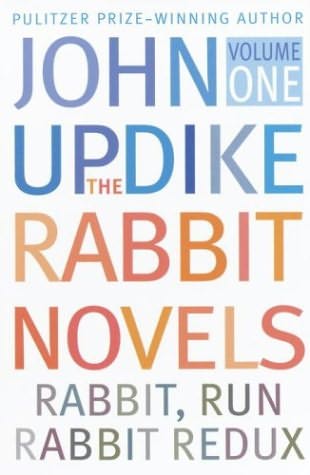 Pushcart prizewinner and perennial Fringe girl-crush Stacey Richter had this to say:
Pushcart prizewinner and perennial Fringe girl-crush Stacey Richter had this to say:A few years ago, I decided to try again. I love embarking on reading projects and I was beginning to feel stupid for having skipped the self-loving males of the twentieth century (not Cheever—I didn’t skip him.) Mostly I read Mailer, Bellow, Roth, and Updike, and of those, I ended up reading the most of Updike because I read the four Rabbit books. I didn’t like Rabbit, Run, but by the time I had finished the quartet I realized what a remarkable project it was: the whole, imagined life of a character, a running document of the times, and it forms a thematic whole. Awesome! What ambition! What’s more, they’re funny, dark, and written with what seems to be an amazing inborn facility. Even the driving around passages were great—essential, even—and I hate driving around passages. But what I liked most about them is also what I hated initially: I came to realize that these books were a chronicle of my parents’ generation—especially the white, middle-class men who were too old to be baby boomers but were still affected by the sexual revolution of the sixties. No wonder I found these books creepy. No teenager wants to read about the inner lives of their parents’ contemporaries—this would suggest that their parents had inner lives. But in the end, that’s what I came to appreciate most about Updike and the other self-loving male writers of the mid twentieth century (who I realized were actually the self-loving/self-loathing writers)—that they were my parents’ contemporaries. Updike was the same age as my father. It makes sense that he would write about suburban life with affection and loathing, and enshroud his characters in entitlement and shame: I see these oppositions in my father’s life, and in the lives of his friends, men who were born into an era when they enjoyed a great deal of privilege (at least compared to women and minorities), and saw that privilege slowly leak away.
Updike was particularly obsessed with chronicling the social movements of his time, and I’m grateful to him for giving me a window into the struggles of my parents. I was especially saddened to hear of his death because I associate him with my father (still alive!) and because there was a little magic for me in Updike after all. Several years ago, I saw a real estate sign with the broker’s name on the bottom: John Updike. I pictured Updike holding an open house, and then I thought how great it would be to go around stenciling the names of great American authors on the bottom of all sorts of real estate signs: Great Floor Plan, Saul Bellow; Open House Cancelled: Joyce Carol Oates. When someone mentioned that Updike really did have a house in Tucson, I assumed it was the real estate Updike and not the genuine one. But I checked the tax records anyway (I’m a pretty good web-stalker). As it happens, there are many John Updikes in the world, and many in Tucson. But there’s only one who also has an address in Updike’s small town of Beverly Farms, and he does indeed own a condo in a golf community in the Tucson foothills. Since then, I sometimes like to pretend that I’m about to run into Updike in Trader Joe’s. I’d be the only person in Tucson to ever recognize him, and I’d just happen to have a copy of one of the Rabbit books with me for him to sign. Like all the old guys, he would be buying fourteen packages of frozen blueberries, and like all the old guys—my father included—his wife would be with him, giving orders and pawing through the salmon.
“Hello Mr. Updike,” I’d say, “it’s so nice to see you.”












